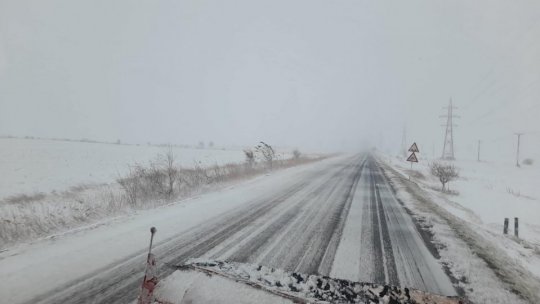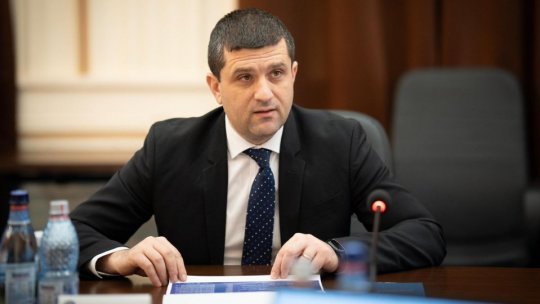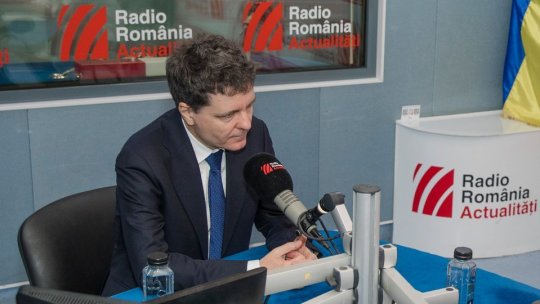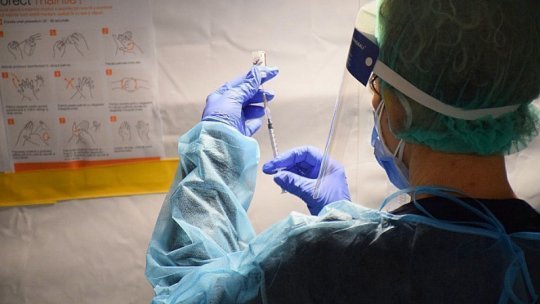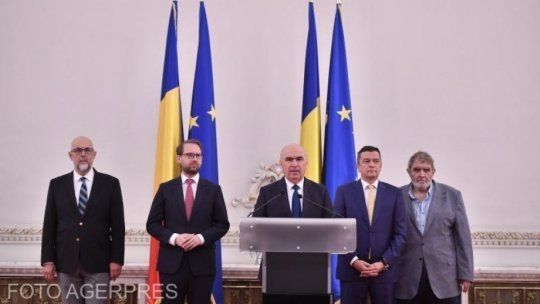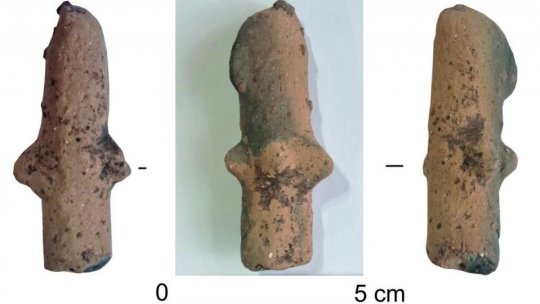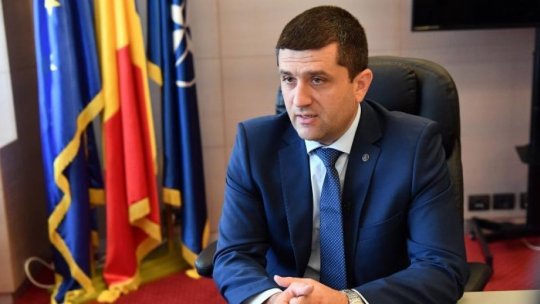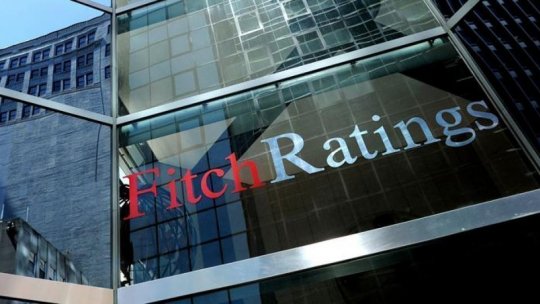Challenges and Priorities of the 11-12 July NATO Summit in Brussels
NATO Heads of State and Government will decide on new command structures and will discuss adapting strategies to the new security developments.
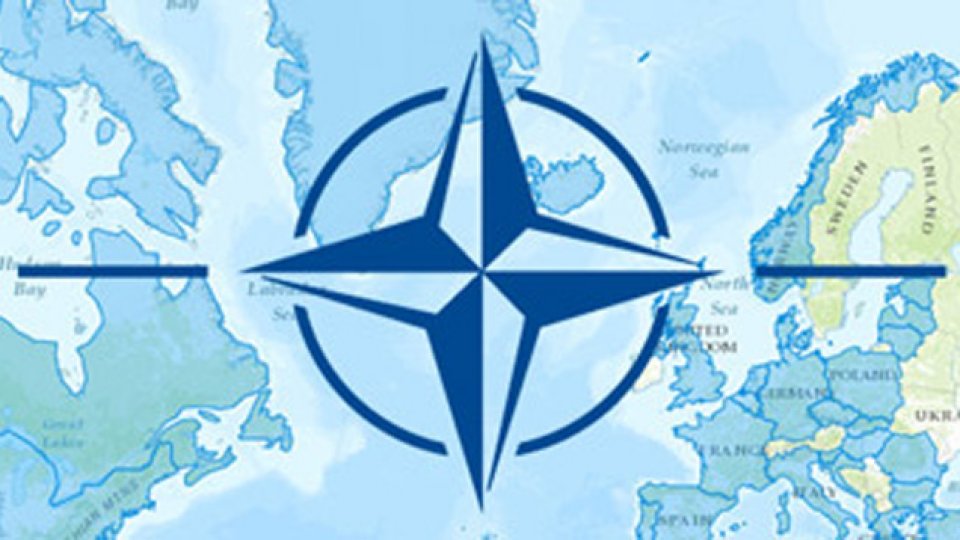
10 Iulie 2018, 15:17
Producer Radu Dobriţoiu: NATO is preparing for one of the most important meetings since the end of the Cold War. NATO Heads of State and Government will meet on 11-12 July in Brussels, Belgium, to take crucial decisions, including the establishment of new command structures, measures to adapt strategies to new security developments on NATO's eastern and northern flank, and a Partnership between the Alliance and the European Union (EU). These topics, military mobility, but also terrorist and cyber threats will dominate the agenda of the Brussels summit. Following NATO summits in Wales and Poland, this week’s high-level meeting in Belgium will reinforce the strategy to discourage military actions triggered by Russia in 2014, along with invasion of Ukraine and annexation of Crimea.
Radio Romania News Producer Radu Dobriţoiu, Military Reporter, titled the latest edition of “Euroatlantica” show of Radio Romania News (Radio Romania Actualități) “Challenges and Priorities of the NATO Summit in Brussels”, having as Special Guest Lt.Gen.(ret) Alexandru Grumaz, Military Analyst, former Consul General of Romania in Shanghai, with interventions of Radio Romania Correspondents in Brussels and Washington.
Radu Dobriţoiu: General, on 11-12 July 2018 we will probably have the most important NATO summit after the end of the Cold War in terms of decisions that will involve changing allied strategies.
Alexandru Grumaz: NATO summit in July has been initially seen as a relaxed meeting of the 29 allies, but unfortunately it will not be the case. US President Donald Trump has sent a series of letters to his allies, apparently around ten, with a clear message: summit will focus on countries that allocate 2% of their GDP for the defense, and those that do not. One of these letters, addressed to the Norwegian Prime Minister Erna Solberg, has been published in the Norwegian press. In this letter, the US President says, and with your permission ... please let me quote, he says about Norway: "It is the only country in NATO that has a border with Russia and has no credible plan to spend 2% of its GDP for the defense. I understand the internal political pressures, as I, personally, have spent considerable political capital to increase our defense spending” - the letter says. "However, it will become increasingly difficult to justify in front of the American citizens why some countries continue to fail to meet our common commitments on collective security". So to draw a first conclusion, the following NATO summit seems to be highly politicized: The Alliance is polarized because of this allocation ... 2% of GDP, although everyone at the Wales Summit promised to allocate 2% of GDP for defense in the period that followed that summit in 2014. Romania is among countries that allocated 2% due to an agreement at all parties, which is very good in terms of our position on the strategic Partnership we have with the US and NATO.
Radu Dobriţoiu: A summit that has been prepared in time, with clearly defined objectives, new headquarters, new strategies, new elements specific to each ally, and a cooperation project between the European Union and NATO.
From Brussels, where the NATO headquarter is, RRA correspondent Amalia Bojescu, for "Euroatlantica":
RRA Reporter: Euro-Atlantic leaders are expected to make formal decisions, based on measures that have been prepared by NATO defense ministers last month, including location of a new Atlantic command and a logistics and mobility command – one in Norfolk, US and the other in Ulm, Germany. Also, a decision by Allied countries is also expected to increase measures for deterrence and collective defense by adopting a plan through which 30 mechanized battalions, 30 air squadrons and 30 combat ships can be deployed, in case of necessity, within 30 days. These military combat devices should be ready by 2020. The new command structure will be reinforced with over 1,200 new staff members. Even though the plan was mainly adopted by NATO defense ministers, important elements such as Allied-specific contributions are yet to be negotiated. Also, NATO and the European Union will sign a new joint statement, the two organizations having already launched technical plans to facilitate military mobility in Europe. The EU has already presented an investment plan for this, while NATO has sent its requests to the EU and insisted on the coherence of these efforts. NATO Secretary General Jens Stoltenberg also expects the Alliance to decide the launch of formal talks on Macedonia's accession to the Alliance.
*
Radu Dobriţoiu: General Grumaz, let's start the analysis of the NATO summit starting from Bucharest. What are Romania’s goals?
Alexandru Grumaz: First of all, the most important goal Romania has set is a Black Sea Strategy. We already have, within the Allied Maritime Command in the UK a group that deals with the risks in the Black Sea, but an effective Black Sea strategy hasn’t been set yet within NATO and that is the most important thing. It has been discussed these days, and I am telling you this as a novelty, it has been discussed at the Naval College in Newport about the "Porcupine Strategy". It is the strategy that is based on three hypotheses. First - geography of the Black Sea and the two straits, Bosphorus and Dardanelles, second - ability of the NATO-backed states to stop and defeat a potential aggression or attack, including counteracting the active measures of the Russian Federation, and third – assurance, by NATO, of deterrence measures to reduce escalation of threats. In essence, this strategy is an option of the A2 / AD strategy (Anti-Access/Area Denial, n.a.) that bans access, where area denial uses several measures that include countering Russian active measures, information warfare, and so on. So Romania is actually turning into an area where elements will be positioned, including Patriot missile batteries brought from Europe, where they are currently deployed for short periods of time to perform exercises in this area and to counteract the A2 / AD zone of Russia in Crimea. What does that mean? There will be a no man's land between the two areas, so there will only be great sacrifices, because you have no communication, you have absolutely nothing.
Radu Dobriţoiu: I was talking to (Chief of Romanian Defense Staff, n.a.)G eneral Nicolae Ciucă in an interview he offered for "Euroatlantica" show and he said that these endowment strategies completely change the options for the future and I remember having been mentioned endowment with anti-ship, Patriot and Heimer missiles.
Alexandru Grumaz: Yes. So despite Donald Trump's rhetoric to this 2% of GDP for the army, he has raised funds for Europe, for the European Deterrence Initiative (EDI) that facilitates not only US presence in Europe but also US presence on (NATO’s) eastern flank. The flank will be reinforced with another armored brigade. Washington has improved, has virtually improved defense of Ukraine and Georgia by delivering weapons, including Javelin anti-tank weapons for Ukrainians. Trump Administration has also continued to impose sanctions against Russia (…) investments are currently made at the former military airports in the eastern flank, in warehouse structures, logistics commands, to support the forces in the eastern flank, and all this money is coming from Washington.
Radu Dobriţoiu: And this justifies the general point of view of the United States, with an emphasis on supporting defense budgets with 2% of GDP for each country.
Alexandru Grumaz: To clarify exactly: according to the 2011 Pentagon budget, the US will invest over 200 million dollars to renovate and modernize European facilities, including advanced air bases, before using them by the US forces. They want to bring 4th and 5th generation aircraft to these areas. We also have the Turzii Plain (Câmpia Turzii), the bases in Kecskemét, Hungary or Malacky, Slovakia, so all the air-bases in this area will be modernized.
Radu Dobriţoiu: And Feteşti base, that also went through a period of modernization.
Alexandru Grumaz: For example, NATO Supreme Allied Commander Europe (SACEUR) Gen.Curtis Scaparrotti acknowledged in his March 2018 submission to the Senate Commission for the Armed Services that the budget required in the financial years 2018 and 2019 would allow for a deployment in Europe of 4th generation aircraft, which is exactly what I was telling you, deployment of troop supporting aircraft and bombers in crisis situations. It is extremely important to have many, many airports where you can make connections and are there bases like Ämari in Estonia, that ensures fuel supply infrastructure and a tactical parking and rolling platform, so all these bases are put on the map repair with American money.
Radu Dobritoiu: General, let us refer now to a concept that has been launched by NATO Secretary General, Jens Stoltenberg, about 30 days ago. It's the famous "30, 30, 30, 30", which means 30 battalions ...
Alexandru Grumaz: "Four 30", "Four Thirties".
Radu Dobriţoiu: 30 infantry battalions, 30 combat squadrons, 30 battle ships in 30 days. What does that mean?
Alexandru Grumaz: This involves pre-training, it involves exercises of allied military in different areas. In fact, one of the issues that will be discussed at the NATO Summit is to intensify the exercises in the Baltic Sea, the Black Sea, aside of using the NATO reaction force, that is, 40,000 soldiers (...). Also, testing the high-readiness force, 4,000 elite soldiers. Plus, as I said earlier, sending of Patriot missile batteries to the Baltic Sea and the Black Sea for exercises, and also interoperability. But there is also a very interesting thing: the United States wants to strengthen the military civilian decision-making process. The speed of running a hybrid war today is very high, and if the decision can’t be taken in real-time in the course of the hostilities, then this decision is almost pointless ...
Radu Dobriţoiu: So bureaucracy can determine a defeat before the enemy does.
Alexandru Grumaz: Yes. In fact, it is necessary to increase the politico-military agility of NATO structures - that is the point, in fact and after all.
Radu Dobriţoiu: The financial contribution of the NATO states will be one of the topics of the summit. Economic and financial issues have an important influence on the transatlantic relationship between European allies and the United States. President Donald Trump has recently sent letters suggesting he is considering a change in US military presence if defense spending is increased.
From the United States, RRA Correspondent Doina Saiciuc, for "Euro-Atlantica":
RRA Reporter: It is clear that the tensions in the relationship between the United States and the European allies have grown just ahead of the NATO summit in July, considered crucial. President Trump has repeatedly criticized the fact that Alliance members contribute little financially to their own defense, but the summit in 11-12 July comes at an even more difficult time, as the transatlantic relationship is already very tense due to Trump's re-imposed sanctions on Tehran after announcing withdrawal of the US from the Iran Nuclear Deal and due to the declared opening of Donald Trump to improve relations with Russian President Vladimir Putin. Only eight of the 29 NATO states honor the 2% of the GDP for the defense: United States, United Kingdom, Greece, Romania, Poland and the three Baltic States. As such, President Trump has recently sent letters to German Chancellor Angela Merkel, Canadian Prime Minister Justin Trudeau, and to the leaders of Belgium and Norway, suggesting that he is considering a change in the American military presence, if those leaders do not increase defense spending: "It will become increasingly difficult to justify to American citizens why some countries do not share the collective security burden, while US soldiers continue to sacrifice their lives across the ocean or return home seriously wounded". The Pentagon is also in a cost-benefit analysis of the 35,000 US troops deployed in Germany. A spokesperson for the Pentagon said on Monday that the analysis is routine and that it would not anticipate a request from the White House to withdraw the troops. In particular, the animosities between Donald Trump and Angela Merkel appear to have grown over the last few months, with President Trump writing on Twitter that "the people of Germany turn against their own leadership". In a letter to German Chancellor Merkel, President Trump writes: "The United States continues to devote more resources to the defense of Europe, when the continent's economy goes well, including that of Germany, and the security challenges abound, and this is no longer sustainable for us".
Radu Dobriţoiu: Doina Saiciuc, in an intervention from the United States for "Euroatlantica", was reminding the collective security burden.
Alexandru Grumaz: Yes. President Donald Trump was not the only one who has sent letters. US Defense Secretary, James Mattis, has also sent a letter to his British counterpart, telling him that if the UK wants to be a global power, as it is, then it has to give more than 2% for the defense, unlike the other countries that are regional powers and have no claims to deploy troops outside the European perimeter. Also very interesting, Wolfgang Ischinger, Chairman of the Munich Security Conference and its organizer, said Germany must increase military spending. He said that Trump can use the NATO summit to reduce US engagement in Europe or to deliver an ultimatum to allies in Europe. So these are things of concern in the European Western Chancelleries, as there is this possibility, scenarios to move the 35,000 US troops from Germany toward the eastern flank.
Radu Dobriţoiu: Toward /Poland and Romania /.
Alexandru Grumaz: Poland has already proposed something like this, moving eastwards, but relocation here is not a matter of auction. It is a strategic / military policy issue.
Radu Dobriţoiu: Poland has announced that it is even willing to contribute financially to supporting US troops.
Alexandru Grumaz: With two billion, yes. In fact, the last NATO-Russia meetings, the NATO-Russia Council, and the meeting between Gen.Valery Gerasimov (Chief of Russia’s General Staff of the Armed Forces, n.a.) and Gen.Joseph Dunford (Chairman of US Joint Chiefs of Staff, n.a.) on June 8, 2018, brought little new things to the arena of the relationship. Probably what will follow, the summit, the meeting between President Donald Trump and President Vladimir Putin, is likely to try to raise some problems like Syria, Ukraine or the situation in the Black Sea. So there are many unclear points in these things that will follow.
Radu Dobriţoiu: What will be discussed in Brussels is very likely to be discussed again between Trump and Putin.
Alexandru Grumaz: It is a fact that President Trump wants to go to Helsinki with a successful NATO summit and an alliance behind him. This is in fact and after all the wish of President Trump to see the cohesion, political unity and developments that NATO's military forces have from the Warsaw summit to the Brussels summit, which is very important. It is clear that America has invested heavily in Eastern Europe and still invests in the European Deterrence Initiative (EDI), it is clear that the summit will deliver a substantial series of military training actions. And here we are talking not only about spending growth, we mean military mobility, an extremely important element of the road, naval, aerial infrastructure in Europe that is not in the best physical condition. We also refer to command structures. There are two new Commands, the Atlantic Command and /.../
Radu Dobriţoiu: Large Commands.
Alexandru Grumaz: Large Commands. It is important that the Atlantic Command is headquartered in Norfolk next to the Allied Command Transformation (ACT), one of the two current Commands, the other being Allied Command Operations (ACO) in Belgium. Command in Ulm is also very well placed...
Radu Dobriţoiu: In Germany.
Alexandru Grumaz: Yes, in Germany, 70 km from the headquarters of the US European Command (EUCOM). All right, we have the (Allied Land Command – LANDCOM, n.a.) Izmir Command ...
Radu Dobriţoiu: And there are also the three-star Commands that have been much talked about, there will be three such Commands. Romania wants to host one of these, which could include a Turkish brigade.
Alexandru Grumaz: Yes, it is clear, this is important. Romania has a strategic position, Romania must first want a military presence, a Command, I would see a NATO Navy Command in the Black Sea area, under subordination of the Allied Maritime Command in the United Kingdom.
Radu Dobriţoiu: Maybe this will be discussed at the next summit, I don’t think this one will cover....
Alexandru Grumaz: But these things depend on us. If we do not suggest, if we do not come up with feasible proposals for the summit agenda, nobody will propose for us these things. You know how it is, on my way to your show, I was thinking about the motto of the South Korean forces “Prepare to fight”” or the motto of the US forces and allies in Europe - "Powerful together." Very important, two motto that tells a lot about what is happening in the respective areas.
Radu Dobriţoiu: I was making a comparison at the beginning of the show with the situation at the end of the Cold War when, we recall, many NATO Commands were dismantled. They were about 60 Commands at the end of the Cold War, now we have about 16, if I'm not mistaken.
Alexandru Grumaz: It’s true (..) Drawing a parallel with physics, there are black holes in physics. Strategic black holes may be more confusing. At present, there are three black holes that NATO faces. One is strategy. Russia's intervention in Ukraine and taking over Crimea were terrifying, to be very clear. We, militaries, digest these things easier, civilians do not digest like us. Also, Russia's active measures are in full swing on both sides of the Atlantic. The Russian Regiment in Syria has supported the diabolical regime of Bashar al-Assad ...
Radu Dobriţoiu: And still supports it.
Alexandru Grumaz: And Russia has become more visible in Libya and the Persian Gulf.
Radu Dobriţoiu: Recently, there were Russian air strikes at the border of Syria and Jordan.
Alexandru Grumaz: What NATO needs is new strategic concepts. The last real strategic review was in 1967, the Harmel Report. Pierre Harmel was a Belgian Foreign Minister who set up a committee charged to draw this strategy. Result was a shift from the exclusive dependence on nuclear deterrence to a flexible war strategy, to deny Moscow's advantages at all levels / looks / conflicts. Today, we are fighting following twentieth-century strategies. We need a strategy for the 21st century, but a real strategy that will lead us to new elements in the hybrid war. One of the black holes also refers to Russia and its active measures. The other black hole, the third, relates to the acquisition of weapons systems. These advances take too long and are too cumbersome and come with what Secretary of State Chuck Hagel said about the "third", about the third "offset".
Radu Dobriţoiu: General, we are approaching the end of the show. Military Mobility - there will be an agreement at this summit between NATO and the EU.
Alexandru Grumaz: Yes, there is an agreement on this and the deadline is 2019, and until then, the inventory of the whole European structure should be made, in order to invest in infrastructure necessary for the mobility of the troops on the eastern flank: airports, roads, railways, ports.
Radu Dobriţoiu: Can we conclude that the NATO summit in Brussels will impose a strategy of the Alliance, adapted to the 21st century?
Alexandru Grumaz: Yes.
Radu Dobriţoiu: Is it difficult to make such decisions?
Alexandru Grumaz: It is very difficult, but such a decision is strictly necessary at the moment.
Radu Dobriţoiu: What would be, apart from cohesion, this funding of 2% of GDP?
Alexandru Grumaz: Well, first of all, financing is essential, because this is the theme from which all this discussion has started. And then a political agreement between the 29 partners in the Alliance.
Radu Dobriţoiu: Do you think Donald Trump is going to put pressure on this budget?
Alexandru Grumaz: Yes, it is normal. America currently gives 3.6 or 3.68 of its GDP, which is very much. Greece gives over 2%, but in Greece, 70% of this money goes to retirement funds and wages, and the rest goes to the endowment, indeed.
Radu Dobriţoiu:"Euroatlantica" at the end. We discussed the Challenges and Priorities of the 11-12 July NATO Summit in Brussels, Belgium.Special guest of this edition was Lt. Gen. (ret) Alexandru Grumaz, Military Analyst, Former Consul General of Romania in Shanghai. I am Radu Dobroţoiu and, together with the Producer of the show, Nicu Popescu, thank you for listening to the "Euroatlantica" show at Radio Romania Actualităţi (Radio Romania News).
Source:RRA.Translated by Miruna Matei

